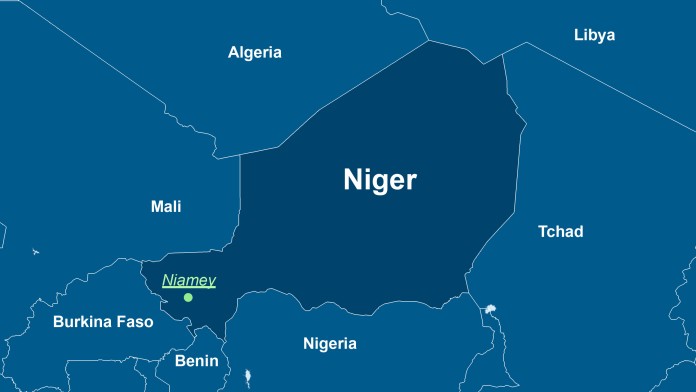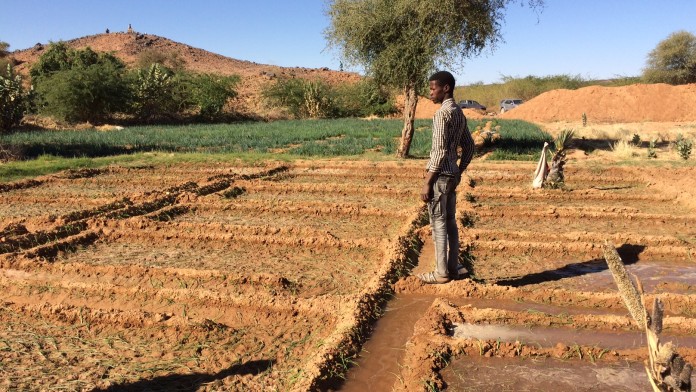
As of: 09/2022
Almost all people in Niger live off agriculture, even though only one-eighth of the country’s surface area is suitable for agricultural production. However, yields are declining. Much of the soil is severely degraded. Strongly fluctuating precipitation levels, increasing extreme weather events such as droughts or floods, and the high prevalence of pests and disease in the fields also have a detrimental impact on agricultural productivity, as well. The food security of the rapidly growing population in Niger is not always guaranteed. As part of a German-Nigerien programme to address priority areas, KfW is promoting climate-adapted, resource-conserving and productive agricultural methods. In this way, KfW contributes to improved security of food supply and long-term job creation.

Climate change is intensifying climatic fluctuations, resulting in irregular or non-existent rainfall. In recent years, there have been frequent serious crop failures in Niger due to insufficient rainfall in the Sahel region.
In 2011, severe crop failures even resulted in over 1.6 million people becoming dependent on food aid. The grain shortfall was almost 700,000 tonnes. There was also a shortage of 10.2 million tonnes of dried fodder (straw) for livestock. In this context, irrigated agriculture is becoming increasingly important.
It is estimated that close to 13 million hectares of arable land can be irrigated. However, this potential is currently underutilised – only around 185,000 hectares of arable land are currently irrigated. Most of the surface water runs off due to insufficient retention measures. Even groundwater could be used for small-scale agricultural irrigation projects, but production on the irrigated land uses a low level of technology.
On behalf of the German Federal Ministry for Economic Cooperation and Development (BMZ), KfW is promoting small-scale agricultural irrigation in the regions of Agadez, Tahoua and Tillabéri as part of the German-Nigerien programme addressing priority areas. For example, it is financing the construction of weirs, wells and pumps for small-scale irrigation. Investments are also being made in the infrastructure required to process, store and market agricultural products – such as warehouses, but also access roads to markets. In addition, funding will be provided for measures to improve water and soil management, such as the construction of stone dams or protective plantings. The target group is the largely poor population working in agriculture.
Even if the selected individual projects cannot be implemented in-house due to the costs or complexity of the task, they will largely be run and maintained by the users themselves following completion. In order to operate and maintain the infrastructure, farmers will receive appropriate training and instruction.
In a participatory application process, user groups or local authorities submit applications for individual project financing. Regional selection committees then decide which individual projects are eligible for funding. They take into account various technical, social, economic and environmental criteria.
The need for investment in small-scale agricultural irrigation in Niger is high. The large number of applications submitted for financing confirms this. Of 772 applications classified as eligible, it was possible to fund almost 200 in the first phase of the project; the majority of the remaining individual projects are to be implemented in the second phase.
The sustainable use of natural resources is intended to ensure that future generations in the beneficiary regions can also make a living from agriculture. Previous successes are visible. At least 5,000 people in the project regions are benefiting directly from the improved irrigation infrastructure. All in all, the project will reach more than 50,000 people with almost 200 individual measures.
The project contributes to increasing the amount of food produced and hence also the income of smallholders. This is achieved by expanding the cultivated area, increasing the yield from agriculture and making sales markets more accessible, for example, thanks to the newly built routes.
In this way, the project also contributes to maintaining and creating jobs. Long-term employment opportunities have a stabilising effect in the security-critical areas of the project regions.
The project contributes to the achievement of these following United Nations Sustainable Development Goals:
KfW Group
KfW Development Bank
Biodiversity, Agriculture and Water West Africa
KfW Office Niamey
Share page
To share the content of this page with your network, click on one of the icons below.
Note on data protection: When you share content, your personal data is transferred to the selected network.
Data protection
Alternatively, you can also copy the short link: https://www.kfw-entwicklungsbank.de/s/enzBYyp5
Copy link Link copied